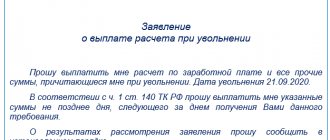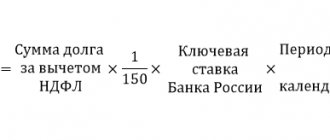What the law says
In accordance with Art. 1 of Federal Law No. 2202-1 of January 17, 1992, the prosecutor’s office in the Russian Federation supervises compliance with laws. That is, you can contact the prosecutor’s office regarding any violation of the law.
According to Art. 10 of the same law, inaction, which includes non-payment of earnings, is grounds for appealing to this government agency.
The procedure for considering citizens' appeals is specified in Federal Law No. 59 of 05/02/2006 and the industry instruction approved by order of the Prosecutor General's Office No. 45 of 01/30/2013. It states (clause 3.1) that the application can be forwarded to another body in accordance with their competence.
IMPORTANT!
The law does not oblige a citizen to appeal the employer’s inaction in a specific government agency, where to write a statement about non-payment of wages, the citizen decides for himself. The choice is between the prosecutor's office at the location of the employer or employee (if the appeal is submitted to the authority not in accordance with its competence, it is redirected), the labor inspectorate, the supervisory authority and the court.
When to complain about non-payment of wages
In accordance with the provisions of Art.
136 of the Labor Code of the Russian Federation, labor must be paid at least twice a month. Salary payment days must be shown in the employment contract. Typically, for the first half of the month payment is made after the 16th day, for the second half - after the 1st day, but no later than the 15th of the month.
Note : The start of the delay in the payment of wages is calculated from the day following the date of payment of wages established by internal departmental regulations. From this moment on, the subordinate has the right to file a claim with the manager demanding payment of wages.
If wages are not paid for more than 15 days, an employee can send a petition, regardless of the type of institution (individual entrepreneur, LLC, JSC, etc.), by sending a request:
- Directly to the head of the institution.
- To the prosecutor's office.
- In the state labor inspectorate (LTI).
- To a judicial institution.
A claim can be made to the head of the company immediately after a delay in payment of wages.
Before sending a request to the prosecutor's office, you must first try to resolve the problematic issue with the head of the company. It must be said that subordinates are not very willing to complain to the prosecutor's office, fearing future conflicts with the company's management. However, if management does not respond to a subordinate’s appeal, the employee, in order to protect his rights, will be forced to complain to the prosecutor’s office.
According to the latest changes in the Labor Code of the Russian Federation, since 2106, the limitation period for collecting wage arrears is one year. Often, management, knowing about the statute of limitations, delays payment, reassuring subordinates with promises, thus achieving an overdue appeal.
How to write an appeal to the prosecutor's office
A unified application form has not been developed. There are no step-by-step instructions on how to write a statement to the prosecutor's office about non-payment of wages; it is drawn up according to the general rules of office work and the requirements set out in Art. 7 FZ-59.
Required details:
- name of the government agency;
- information about the applicant;
- mailing address;
- the essence of the appeal, what the violation of rights and laws consists of;
- signature and date.
There are three parts of the complaint: introductory, main (or descriptive) and final, operative.
IMPORTANT!
Anonymous applications are not considered by government agencies. The prosecutor's office accepts collective applications from several citizens on a general basis.
To make your complaint more convincing and help solve the problem, study court decisions on similar cases. The database of judicial practice in ConsultantPlus will help you find them (get free access to it by clicking on the link below). The database contains decisions of all Russian courts, and the search is as simple as in Yandex. Be sure to refer in the text of the appeal to those cases that the court decided “in your” favor.
Introductory part
This is a header located in the upper right corner of the sheet with factual data about the addressee and applicant, document:
- name of the prosecutor's office, last name, first name and patronymic of the prosecutor and his position (the second is optional);
- surname, name and patronymic of the author (patronymic is indicated if available);
- address for sending a response;
- telephone for communication;
- the title of the document in the center of the sheet.
Descriptive part
This part consists of a list of specific facts (their legal assessment is optional):
- name of the employer (it is recommended to indicate the address to speed up the review);
- employment data (date, position, salary);
- period of delay of wages;
- amount of debt;
- information about interactions with the employer regarding debt.
The information is provided accurately, in accordance with the available documents, the writing style is businesslike.
The operative part
This lists the requirements for the government body to carry out actions to supervise the rule of law: conducting an inspection, making representations within the scope of authority, bringing the perpetrators to justice. The following is a list of applications. Without a signature and date, the document will not be considered (since its execution does not comply with the law).
If an employment contract has not been concluded
In conditions of unemployment, workers often agree to any conditions when working for a company.
A number of managers take advantage of this situation in the labor market, abusing many mandatory provisions of labor standards. One of the most serious violations is the unofficial hiring of an employee by a company, without filling out an employment contract. In this case, management does not bear any obligations to the subordinate.
Often the promised wages are not accrued at all. In such a situation, it is much more difficult to seek the renewal of your rights. Of course, you need to go to the prosecutor's office with a complaint, which is formalized exactly as described above. However, the main thing that needs to be done in such circumstances is to collect materials proving that the person worked at this enterprise. The only possible evidence may be the involvement of witnesses.
Witnesses can be both clients of the enterprise and colleagues with whom the employee worked together. In addition, working documents containing the signature of the dismissed person or which he drew up in his own hand, copies of agreements, acts, invoices, as well as printouts of telephone conversations with officials of the enterprise may be useful as evidence.
Art. 67 of the Labor Code of the Russian Federation regulates that an unformed contract is considered concluded if the employee, with the knowledge of the manager, began to fulfill the duties assigned to him. Therefore, a dismissed employee needs to make every effort to prove the employer’s wrongdoing.
In the video provided, you can familiarize yourself with the rules for filling out a request to the prosecutor's office.
( Video : “How to write a statement to the prosecutor’s office”)
Submission of documents
There are several ways to submit your request:
- Through the reception desk with writing the incoming request number;
- In person, at a reception with the prosecutor;
- By mail, by registered letter with a list of attached documents;
- Online through the portal of the Prosecutor General's Office.
Before submitting an application to the prosecutor's office, you must once again check the correctness of its spelling and the presence of all necessary additional documents.
Appeals to law enforcement agencies must be of a claim nature. That is, before writing a complaint to the prosecutor’s office against an employer regarding wages, an employee is obliged to draw up and submit a complaint to the management of the company where he works. Only after receiving a response (or refusal to consider the claim), you can write a complaint to the supervisory authorities and the prosecutor's office.
If violations of labor rights are widespread, you can file a collective complaint (Article 33 of the Constitution of the Russian Federation).
Collective appeal
A collective statement is drawn up according to the same algorithm as a single one. The only difference will be that the header of the appeal indicates not just one applicant, but all the persons from whom the complaint is received, or the data of the initiative group of persons is indicated. Another option is to write in the header of the application the information that the applicants are the staff of the enterprise, and register all applicants on a separate sheet of paper, which should be included in the list of additional documents.
At the end of the document, you will also need to put the signatures of all employees from whom the application is received.
Contact your employer
If you are faced with a problem with paying wages, then the first step in solving such a problem will be to contact the organization itself. It is quite possible that you will be able to resolve the issue of your salary with the organization yourself, and you will not need to contact government agencies.
However, if it was not possible to resolve the problem, then contacting the organization will be a weighty argument in the future case, and ignoring it will bring big problems to the employer. You should also make sure that you have a second copy of this document.
When will the application be considered?
The period for consideration of an appeal is 30 days from the date of its registration with the prosecutor's office, and for applications that do not require additional study and verification - 15 days (clause 5.1 of the order of the Prosecutor General's Office of Russia No. 45 of January 30, 2013). When submitted electronically, this period is 30 days from the date of registration of the application on the website in accordance with Art. 12 Federal Law No. 59-FZ of May 2, 2006 “On the procedure for considering applications from citizens of the Russian Federation” (registration notification is sent via SMS or email).
The period begins to run the next day after registration of documents.
How much does a claim cost?
Article 393 of the Labor Code of the Russian Federation establishes that when filing a claim with the employer in court, an employee is exempt from paying state duty.
To increase the chances of winning in the process, professional legal support is involved. This is a paid service. The cost depends on the experience of the lawyer, the region in which the proceedings take place, and the complexity of the issue. For example, in Moscow, consultation with a lawyer on salary issues costs from 2,000 rubles, and support in court - from 3,500 rubles.
Upon dismissal
When deciding on the payment of wages, employers often use administrative resources. Salaries may not be paid, either to one employee or to the entire team, for various reasons. This is especially true when an employee is fired.
The conflict between the employer and the employee over non-payment of wages sometimes becomes such that the head of the institution can begin to “insert sticks” to the employee, up to his dismissal and preventing him from issuing a work book. Most often, non-payment of wages occurs following the dismissal of an employee.
Under such circumstances there is no need to despair. If the accounting department does not issue any documents to the dismissed employee, or management refuses to accept written demands from the dismissed employee to comply with the law, then such documents must be sent by registered mail with notification.
If even after this the employee does not show a reaction to his appeal, then it is necessary to submit a written application to the prosecutor about the delay in wages upon dismissal. The appeal must display all the facts that caused the lack of necessary materials.
Key points that must be reflected in the application:
- Where is the appeal addressed?
- Information about an employee who needs protection of rights.
- Details of the institution from which the employee was dismissed while carrying out his work activities.
- Indicate the period for which the salary was delayed.
- The time that has passed since the salary should have been paid.
- The amount of wages owed.
- The position held by the employee before leaving the given institution.
- List of attached documents.
- Date of filing the complaint and signature of the author.
- Documents attached to the written request.
When filling out an application, you must state the essence of the claim, justifying all the facts with reference to the supporting attached materials.
A list of possible attached materials is presented below:
- It is necessary to attach materials that provide evidence of non-payment of wages. (Bank statements, when paying with an institution via a bank card; supporting documents from the accounting department, etc.).
- A photocopy of the employment agreement, certified accordingly.
- A photocopy of the work book (the original is possible).
- Other documents related to this conflict.
If the dismissed employee did everything correctly and collected sufficient evidence of violation of his rights by the management of the institution, then his claim will be quickly resolved.
As a rule, when contacting the prosecutor's office, a phone call from the prosecutor to the employer will be enough, and he will quickly resolve the conflict with the payment of delayed wages to the dismissed employee, so as not to be subject to penalties.
Employee procedure
The legislation of the Russian Federation affirms the ability of employees to protect legal rights.
This can be done with:
- filing a claim with a court;
- filing a complaint with the Labor Inspectorate;
- sending the complaint to the director of the enterprise organization in writing;
- stopping the work process;
- sending a complaint to the Prosecutor's Office;
- appeal to the labor dispute commission.
Attention! You may not go to work in the following cases:
- if employees of the enterprise have not been paid wages for more than 15 days;
- in cases where a person does not work in the public service;
- if the employee does not serve in a military structure;
- Employees whose activities are not related to ensuring the livelihoods of citizens can suspend work.
Work cannot be suspended if a state of emergency is declared. In addition, employees are required to notify the organization's management of their intention not to return to work in writing.
Before going to court, you should try to resolve the issue within the enterprise. To do this, employees send a written complaint to the manager with a demand to resolve the current situation.
If the employer has not responded to the employees’ demands, you can file a claim in court to resolve the dispute.
If in court the employees can provide evidence that the employer has not paid wages for a long time, and they tried to resolve the issue pre-trial, a decision is made in favor of the plaintiffs.
For non-payment of wages over a long period, the director of an organization may be held criminally liable.
Watch the video. Employer doesn't pay? Enough tolerating this!






